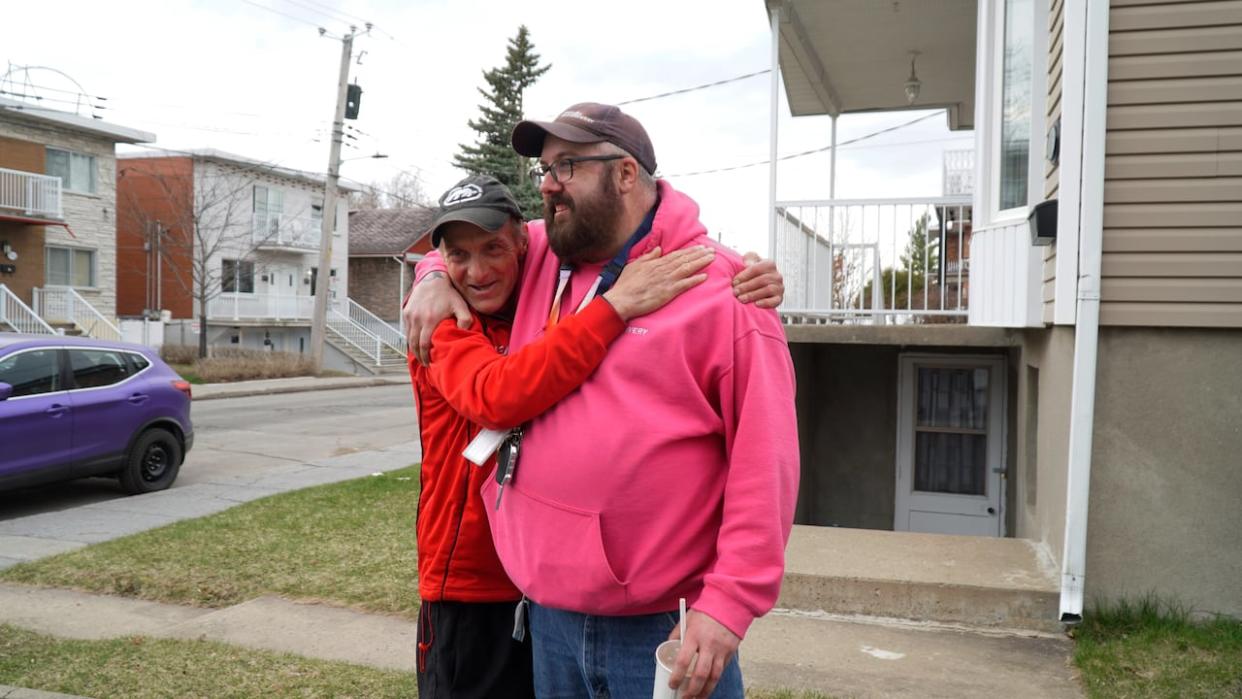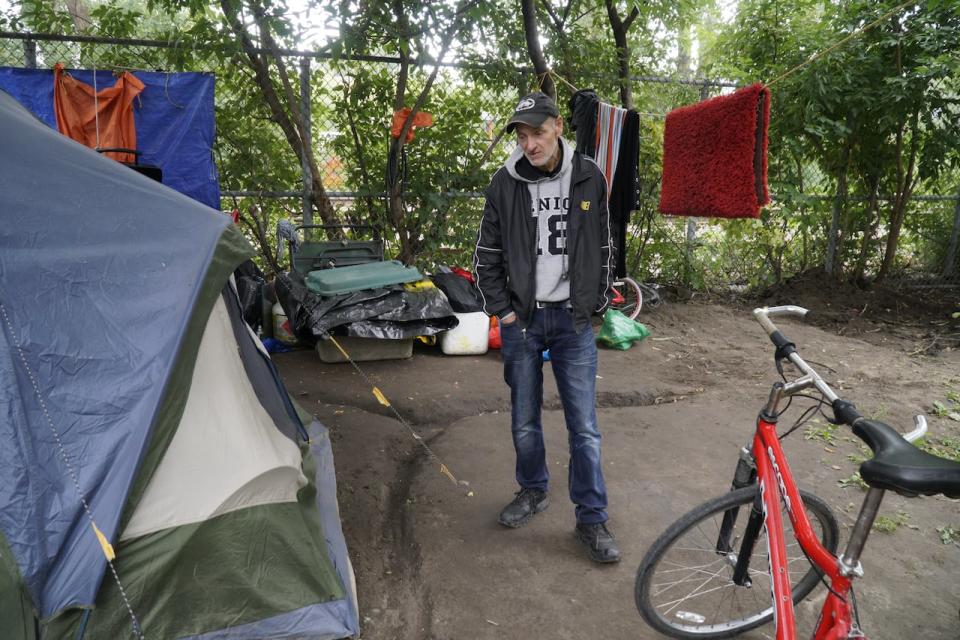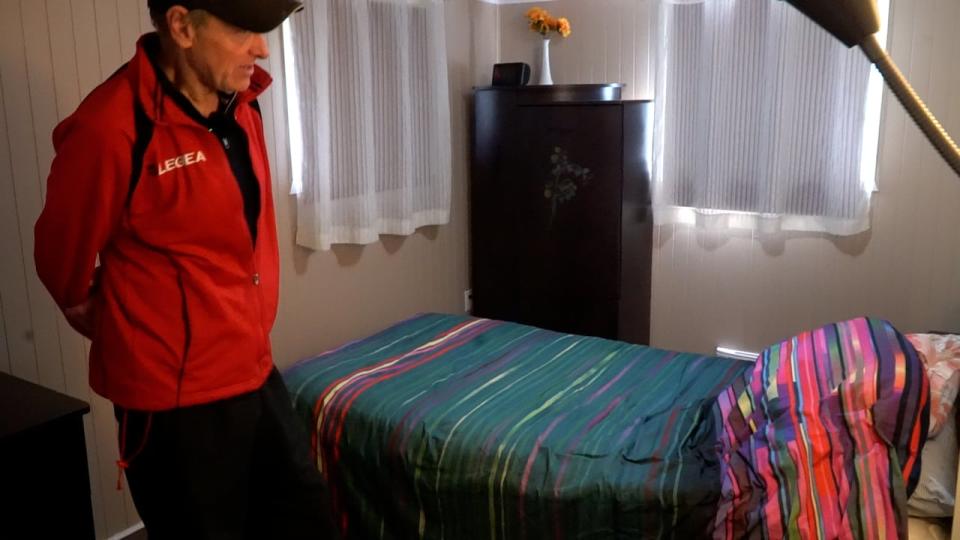How one man got housing after 3 years in a tent

It'd been several weeks since Nicholas Singcaster had heard from Conrad Tremblay, the 62-year-old unhoused man he had been visiting at a camp on a small patch of grass between a railway and a bike path.
They'd missed each other a few times. Plus, Singcaster was getting ready for the winter ahead with the mobile clinic he runs for the Old Brewery Mission, one of Montreal's biggest homeless shelters.
As an outreach worker for the shelter, Singcaster had met Tremblay last summer, a few months after the clinic launched. It was created in response to the growing number of homeless people in the city, which by some estimates doubled during the pandemic. The lack of space in shelters has meant many are having to sleep in the street or in camps like Tremblay's.
"We decided to reach out to people instead of waiting for them to come to us," Singcaster said.
He'd grown attached to the chatty man with the organized tent, regularly making visits to check up on him.
Tremblay spent three winters living outside and had figured out all the ways of making doing so possible. His setup included a barbecue, a clothesline, an insulated tarp, a drainage ditch; meticulously placed items sat on top of a bookshelf next to his mattress propped up by milk cartons.
He regularly cooked for encampment neighbours, unhoused friends, and when CBC visited him last September, was letting one of those friends, Geneviève, sleep in his tent. Every night, to pay for food and supplies, he set off on his bike and found aluminum cans in people's trash.
Singcaster helped Tremblay with other things: filing paperwork and taxes. The kinds of things that take a backseat to surviving; the kinds of things needed to get back into housing. And that's what was next on Singcaster's list for Tremblay: finding him a new home.
"You're not spending another winter here," he'd told a skeptical Tremblay.
So when the first big snowfall hit in November, he drove up to the dead-end road leading to the overpass near the camp to see how his friend was doing. When he walked over, the tent was caved in.
WATCH | The story behind Conrad Tremblay's new home:
Singcaster rushed over, worried Tremblay was pinned underneath the snow, but his neighbour said Tremblay had been taken away in an ambulance after a cardiac issue. Singcaster called a few hospitals, finding him at the Jewish General and in a bad way.
On top of the heart problems, Tremblay had developed a serious leg infection from a fall on a rusty piece of metal. His leg was operated on and then his heart to repair an arrhythmia. In all, he spent three months in hospital.
No going back
He told Singcaster he didn't want to go back to the camp. "This is it," he'd said. "Find me a place. I'm ready."
Singcaster got to work. He enlisted Tremblay into the Mission's housing program, which located two possible units he could stay in, overseen by landlords willing to participate. As it turned out, Tremblay was a good candidate for a rent subsidy since most of his affairs were in order.
Tremblay had one main request, that the apartment have a closed bedroom. "I've got too much stuff," he said. In reality, Tremblay was starting anew. He asked Singcaster to get rid of everything he owned at the camp and said he didn't want to live nearby. He hoped for a place in Rosemont, but was content when a little basement suite opened up in Montréal-Nord.
"I'll take it," he said the moment he stepped inside. In March, he moved in. His landlords are a couple with two children, who live on the upper floors of the small house with a backyard on a quiet street.

The tent where Conrad Tremblay used to live, pictured in September 2023. (Verity Stevenson/CBC)
"I love it here. I finally have a place to call home," he said as he walked down the steps to his entrance.
Inside, the space is sparse but homey — and spotless. Two comfy rocking chairs, one of them reclining, sit in front of a large television that belonged to Tremblay's mother, who died recently. A framed picture of her rests on a shelf above his single bed.
The bathroom was recently renovated and Tremblay raves about the fact that he can take showers every day.
"When it rains, I'm sheltered. When it's cold, I have a roof above my head," he said, standing in his kitchen. "I have a fridge to store all my food. I didn't have this stuff over there."

Conrad Tremblay inherited his mother's old furniture. (CBC)
The shelter is hailing Tremblay as a success story made possible thanks to the clinic, which is partly funded by telecom giant Telus and says it's carried out 2,691 interactions since it started operations. But the way Tremblay sees it, it was all Singcaster.
"He is the best outreach worker. He worked very hard for me and I appreciate him a lot," he said.
Singcaster admits that Tremblay's transition into housing directly from living outside is rare.
The number of encampments in Montreal has been growing, and so have the city's efforts at dismantling them, pushing people further into dangerous situations, advocates say, against the backdrop of a lack of affordable housing.
The Old Brewery Mission's housing program was able to secure a rent subsidy covering about 60 per cent of Tremblay's rent. He has an income, thanks to social assistance, of about $1,100 per month and pays about $300 in rent, Singcaster said.
A provincial survey on homelessness conducted in 2022 and published in the fall estimated that at least 4,690 people in Montreal were unhoused and that roughly 1,000 of them were spending their nights in public spaces.
For years, advocates have decried a lack of government funding toward homelessness services and housing.

